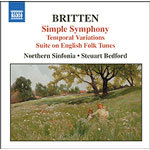
Britten: Simple Symphony / Temporal Variations / Suite on English Folk Tunes
 $25.00
Out of Stock
$25.00
Out of Stock6+ weeks add to cart
BENJAMIN BRITTEN
Britten: Simple Symphony / Temporal Variations / Suite on English Folk Tunes
Nicholas Daniel (oboe) / Philip Dukes (viola) / Catherine Wyn-Rogers (mezzo-soprano) / Northern Sinfonia / Steuart Bedford, conductor
[ Naxos / CD ]
Release Date: Tuesday 1 February 2005
This item is currently out of stock. It may take 6 or more weeks to obtain from when you place your order as this is a specialist product.
"And so Naxos has unfolded yet more layers of this astonishing composer; an issue to cherish, and, at over seventy minutes, excellent value too."
(MusicWeb, 15 February 2005)
"The Trois aquarelles for flute, cello, and piano comprise the most substantial piece on this disc, lasting nearly a quarter hour, and they're so lovely that it's almost painful. Also noteworthy: the sexy little Divertissement grec for two flutes and harp, and the charming Suite in four movements that concludes the disc. But really, if you like any of it, you'll love all of it. Boston Symphony Orchestra flutist Fenwick Smith plays these pieces with a big, full tone and complete absence of irritating breathiness. In the Divertissement, he and his BSO colleague Jacques Zoon play wooden flutes, and his fellow musicians support him admirably. Pianist Sally Pinkas makes a particularly considerate partner, managing to characterize her playing quite well without overwhelming the flute in climactic passages. The sonics also do full justice to Smith's limpid tone and offer excellent balances between the various performers...this is a delightful disc by any standard, and one that works equally well as a light background or as an engaging foreground."
-David Hurwitz, Classicstoday.com
The works recorded on this disc cover the entire span of Britten's published output, from the Simple Symphony of 1934, itself based on material from the composer's earliest years, to the string orchestral arrangement of Lachrymae completed in 1976, the last year of Britten's life.
Britten began composing at a very early age: his juvenilia, most of which he carefully preserved, consists of an enormous number of piano pieces, songs, chamber music and orchestral works. Unlike many composers, Britten always retained a special affection for these childhood efforts and was even persuaded to revive and publish some of them in later life (and many more have appeared posthumously). When, late in 1933, he decided to try his hand at writing a money-spinner for the lucrative schools market, he turned to this early body of work to fashion what became the Simple Symphony, Op. 4, for string orchestra (or string quartet). In doing so he took the opportunity to rework the material somewhat, making it 'more fit for general consumption', as he put it. In fact comparison of the original pieces with their transformation in the Simple Symphony clearly demonstrates Britten's astonishing progression from a musically gifted child to a consummate master of his craft at the age of just 21. The work's four movements are memorably tuneful, technically polished and superbly conceived for the medium, the Playful Pizzicato being an especially delightful invention.
One of the more striking of the numerous works to have been published since Britten's death in 1976 is the Temporal Variations for oboe and piano, composed in 1936 and first performed at the Wigmore Hall in December of that year by the oboist Natalie Caine, a friend of Britten's from his Royal College of Music days. Although Britten declared himself pleased with the performance and the favourable audience response, the generally negative reviews of several critics may have played a part in his decision to withdraw the work, which was never heard again during his lifetime. Before composing the piece Britten had announced that he was working on a 'large and elaborate suite for oboe and strings'. Although this did not materialise, in the early 1990s the oboist Nicholas Daniel (the soloist on the present recording) suggested to the composer Colin Matthews that an arrangement of the Variations for oboe and strings could well take the place of the aborted suite. Thus the première of the orchestrated version was given at the Aldeburgh Festival in June 1994 with Daniel as soloist and the English Chamber Orchestra conducted by Steuart Bedford. Formally the work is a series of short character-sketches, by turns light-hearted and contemplative, bound together by use of the plangent semi-tone motif with which the oboe opens the work and with which it concludes. In this respect the Temporal Variations can be seen as something of a trial run for the more fully accomplished achievement of the Variations on a theme of Frank Bridge, composed some six months later.
Tracks:
A Charm of Lullabies, Op. 41 (arr. C. Matthews)
Lachrymae, Op. 48a
Simple Symphony, Op. 4
Suite on English Folk Tunes, Op. 90, "A time there was..."
Temporal Variations (orch. C. Matthews)
